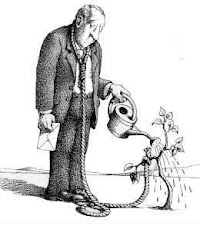Grammar is the system of a language. People sometimes describe grammar as the "rules" of a language; but in fact no language has rules*. If we use the word "rules", we suggest that somebody created the rules first and then spoke the language, like a new game. But languages did not start like that. Languages started by people making sounds which evolved into words, phrases and sentences. No commonly-spoken language is fixed. All languages change over time. What we call "grammar" is simply a reflection of a language at a particular time.
Do we need to study grammar to learn a language? The short answer is "no". Very many people in the world speak their own, native language without having studied its grammar. Children start to speak before they even know the word "grammar". But if you are serious about learning a foreign language, the long answer is "yes, grammar can help you to learn a language more quickly and more efficiently." It's important to think of grammar as something that can help you, like a friend. When you understand the grammar (or system) of a language, you can understand many things yourself, without having to ask a teacher or look in a book.
So think of grammar as something good, something positive, something that you can use to find your way - like a signpost or a map.
· Except invented languages like Esperanto. And if Esperanto were widely spoken, its rules would soon be very different.
Glossary of English Grammar Terms
Active Voice
in the active voice, the subject of the verb does the action (eg They killed the President). See also Passive Voice.
Adjective
A word like big, red, easy, French etc. An adjective describes a noun or pronoun.
Adverb
A word like slowly, quietly, well, often etc. An adverb modifies a verb.
ArticleThe "indefinite" articles are a and an. The "definite article" is the.
Auxiliary Verb
A verb that is used with a main verb. Be, do and have are auxiliary verbs. Can, may, must etc are modal auxiliary verbs.
Clause
A group of words containing a subject and its verb (for example: It was late when he arrived).
Conjunction
A word used to connect words, phrases and clauses (for example: and, but, if).
Infinitive
The basic form of a verb as in to work or work.
Interjection
An exclamation inserted into an utterance without grammatical connection (for example: oh!, ah!, ouch!, well!).
Modal Verb
An auxiliary verb like can, may, must etc that modifies the main verb and expresses possibility, probability etc. It is also called "modal auxiliary verb".
Noun
A word like table, dog, teacher, America etc. A noun is the name of an object, concept, person or place. A "concrete noun" is something you can see or touch like a person or car. An "abstract noun" is something that you cannot see or touch like a decision or happiness. A "countable noun" is something that you can count (for example: bottle, song, dollar). An "uncountable noun" is something that you cannot count (for example: water, music, money).
Object
In the active voice, a noun or its equivalent that receives the action of the verb. In the passive voice, a noun or its equivalent that does the action of the verb.
Participle
The -ing and -ed forms of verbs. The -ing form is called the "present participle". The -ed form is called the "past participle" (for irregular verbs, this is column 3).
Part Of Speech
One of the eight classes of word in English - noun, verb, adjective, adverb, pronoun, preposition, conjunction and interjection.
Passive Voice
In the passive voice, the subject receives the action of the verb (eg The President was killed). See also Active Voice.
Phrase
A group of words not containing a subject and its verb (eg on the table, the girl in a red dress).
Predicate
Each sentence contains (or implies) two parts: a subject and a predicate. The predicate is what is said about the subject.
Preposition
A word like at, to, in, over etc. Prepositions usually come before a noun and give information about things like time, place and direction.
Pronoun
A word like I, me, you, he, him, it etc. A pronoun replaces a noun.
Sentence
A group of words that express a thought. A sentence conveys a statement, question, exclamation or command. A sentence contains or implies a subject and a predicate. In simple terms, a sentence must contain a verb and (usually) a subject. A sentence starts with a capital letter and ends with a full stop (.), question mark (?) or exclamation mark (!).
Subject
Every sentence contains (or implies) two parts: a subject and a predicate. The subject is the main noun (or equivalent) in a sentence about which something is said.
Tense
The form of a verb that shows us when the action or state happens (past, present or future). Note that the name of a tense is not always a guide to when the action happens. The "present continuous tense
English Parts of Speech
There are thousands of words in any language. But not all words have the same job. For example, some words express "action". Other words express a "thing". Other words "join" one word to another word. These are the "building blocks" of the language. Think of them like the parts of a house. When we want to build a house, we use concrete to make the foundations or base. We use bricks to make the walls. We use window frames to make the windows, and door frames to make the doorways. And we use cement to join them all together. Each part of the house has its own job. And when we want to build a sentence, we use the different types of word. Each type of word has its own job.
We can categorize English words into 8 basic types or classes. These classes are called "parts of speech".
It's quite important to recognize parts of speech. This helps you to analyze sentences and understand them. It also helps you to construct good sentences.
In this lesson, we have an overview of the eight parts of speech, followed by a quiz to check your understanding:", for example, can be used to talk about the present or the future.
Verb
A word like (to) work, (to) love, (to) begin. A verb describes an action or state.




